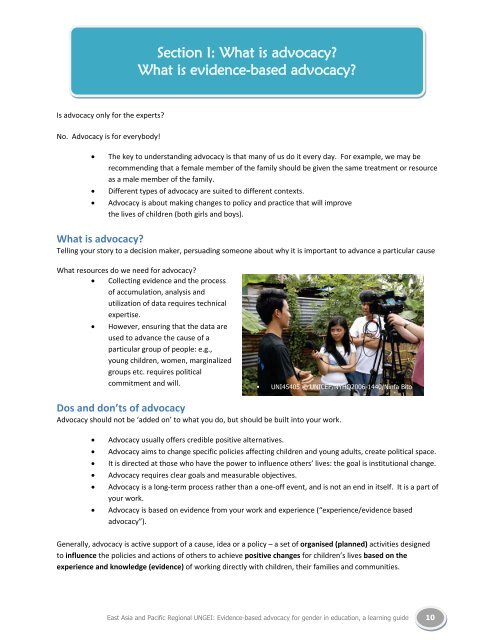Evidence-Based Advocacy - United Nations Girls' Education Initiative
Evidence-Based Advocacy - United Nations Girls' Education Initiative
Evidence-Based Advocacy - United Nations Girls' Education Initiative
Create successful ePaper yourself
Turn your PDF publications into a flip-book with our unique Google optimized e-Paper software.
Section I: What is advocacy?<br />
What is evidence-based advocacy?<br />
Is advocacy only for the experts?<br />
No. <strong>Advocacy</strong> is for everybody!<br />
<br />
<br />
<br />
The key to understanding advocacy is that many of us do it every day. For example, we may be<br />
recommending that a female member of the family should be given the same treatment or resource<br />
as a male member of the family.<br />
Different types of advocacy are suited to different contexts.<br />
<strong>Advocacy</strong> is about making changes to policy and practice that will improve<br />
the lives of children (both girls and boys).<br />
What is advocacy?<br />
Telling your story to a decision maker, persuading someone about why it is important to advance a particular cause<br />
What resources do we need for advocacy?<br />
Collecting evidence and the process<br />
of accumulation, analysis and<br />
utilization of data requires technical<br />
expertise.<br />
However, ensuring that the data are<br />
used to advance the cause of a<br />
particular group of people: e.g.,<br />
young children, women, marginalized<br />
groups etc. requires political<br />
commitment and will.<br />
<br />
UNI45405 © UNICEF/NYHQ2006-1440/Ninfa Bito<br />
Dos and don’ts of advocacy<br />
<strong>Advocacy</strong> should not be ‘added on’ to what you do, but should be built into your work.<br />
<br />
<br />
<br />
<br />
<br />
<br />
<strong>Advocacy</strong> usually offers credible positive alternatives.<br />
<strong>Advocacy</strong> aims to change specific policies affecting children and young adults, create political space.<br />
It is directed at those who have the power to influence others’ lives: the goal is institutional change.<br />
<strong>Advocacy</strong> requires clear goals and measurable objectives.<br />
<strong>Advocacy</strong> is a long-term process rather than a one-off event, and is not an end in itself. It is a part of<br />
your work.<br />
<strong>Advocacy</strong> is based on evidence from your work and experience (“experience/evidence based<br />
advocacy”).<br />
Generally, advocacy is active support of a cause, idea or a policy – a set of organised (planned) activities designed<br />
to influence the policies and actions of others to achieve positive changes for children’s lives based on the<br />
experience and knowledge (evidence) of working directly with children, their families and communities.<br />
East Asia and Pacific Regional UNGEI: <strong>Evidence</strong>-based advocacy for gender in education, a learning guide 10

















